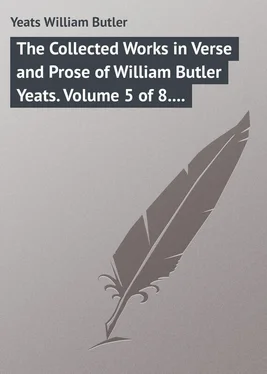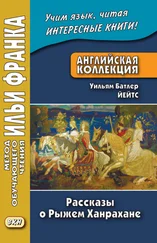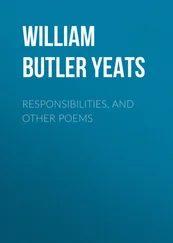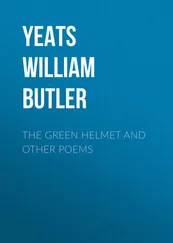William Yeats - The Collected Works in Verse and Prose of William Butler Yeats. Volume 5 of 8. The Celtic Twilight and Stories of Red Hanrahan
Здесь есть возможность читать онлайн «William Yeats - The Collected Works in Verse and Prose of William Butler Yeats. Volume 5 of 8. The Celtic Twilight and Stories of Red Hanrahan» — ознакомительный отрывок электронной книги совершенно бесплатно, а после прочтения отрывка купить полную версию. В некоторых случаях можно слушать аудио, скачать через торрент в формате fb2 и присутствует краткое содержание. ISBN: , Жанр: foreign_language, foreign_prose, на английском языке. Описание произведения, (предисловие) а так же отзывы посетителей доступны на портале библиотеки ЛибКат.
- Название:The Collected Works in Verse and Prose of William Butler Yeats. Volume 5 of 8. The Celtic Twilight and Stories of Red Hanrahan
- Автор:
- Жанр:
- Год:неизвестен
- ISBN:http://www.gutenberg.org/ebooks/49612
- Рейтинг книги:4 / 5. Голосов: 1
-
Избранное:Добавить в избранное
- Отзывы:
-
Ваша оценка:
- 80
- 1
- 2
- 3
- 4
- 5
The Collected Works in Verse and Prose of William Butler Yeats. Volume 5 of 8. The Celtic Twilight and Stories of Red Hanrahan: краткое содержание, описание и аннотация
Предлагаем к чтению аннотацию, описание, краткое содержание или предисловие (зависит от того, что написал сам автор книги «The Collected Works in Verse and Prose of William Butler Yeats. Volume 5 of 8. The Celtic Twilight and Stories of Red Hanrahan»). Если вы не нашли необходимую информацию о книге — напишите в комментариях, мы постараемся отыскать её.
The Collected Works in Verse and Prose of William Butler Yeats. Volume 5 of 8. The Celtic Twilight and Stories of Red Hanrahan — читать онлайн ознакомительный отрывок
Ниже представлен текст книги, разбитый по страницам. Система сохранения места последней прочитанной страницы, позволяет с удобством читать онлайн бесплатно книгу «The Collected Works in Verse and Prose of William Butler Yeats. Volume 5 of 8. The Celtic Twilight and Stories of Red Hanrahan», без необходимости каждый раз заново искать на чём Вы остановились. Поставьте закладку, и сможете в любой момент перейти на страницу, на которой закончили чтение.
Интервал:
Закладка:
I know some who believe they have seen the headless ghost upon the quay, and one who, when he passes the old cemetery wall at night, sees a woman with white borders to her cap 2 2 I wonder why she had white borders to her cap. The old Mayo woman, who has told me so many tales, has told me that her brother-in-law saw ‘a woman with white borders to her cap going round the stacks in a field, and soon after he got a hurt, and he died in six months.’
creep out and follow him. The apparition only leaves him at his own door. The villagers imagine that she follows him to avenge some wrong. ‘I will haunt you when I die’ is a favourite threat. His wife was once half-scared to death by what she considers a demon in the shape of a dog.
These are a few of the open-air spirits; the more domestic of their tribe gather within-doors, plentiful as swallows under southern eaves.
One night a Mrs. Nolan was watching by her dying child in Fluddy’s Lane. Suddenly there was a sound of knocking heard at the door. She did not open, fearing it was some unhuman thing that knocked. The knocking ceased. After a little the front-door and then the back-door were burst open, and closed again. Her husband went to see what was wrong. He found both doors bolted. The child died. The doors were again opened and closed as before. Then Mrs. Nolan remembered that she had forgotten to leave window or door open, as the custom is, for the departure of the soul. These strange openings and closings and knockings were warnings and reminders from the spirits who attend the dying.
The house ghost is usually a harmless and well-meaning creature. It is put up with as long as possible. It brings good luck to those who live with it. I remember two children who slept with their mother and sisters and brothers in one small room. In the room was also a ghost. They sold herrings in the Dublin streets, and did not mind the ghost much, because they knew they would always sell their fish easily while they slept in the ‘ha’nted’ room.
I have some acquaintance among the ghost-seers of western villages. The Connaught tales are very different from those of Leinster. These H – spirits have a gloomy, matter-of-fact way with them. They come to announce a death, to fulfil some obligation, to revenge a wrong, to pay their bills even – as did a fisherman’s daughter the other day – and then hasten to their rest. All things they do decently and in order. It is demons, and not ghosts, that transform themselves into white cats or black dogs. The people who tell the tales are poor, serious-minded fishing people, who find in the doings of the ghosts the fascination of fear. In the western tales is a whimsical grace, a curious extravagance. The people who recount them live in the most wild and beautiful scenery, under a sky ever loaded and fantastic with flying clouds. They are farmers and labourers, who do a little fishing now and then. They do not fear the spirits too much to feel an artistic and humorous pleasure in their doings. The ghosts themselves share in their quaint hilarity. In one western town, on whose deserted wharf the grass grows, these spirits have so much vigour that, when a misbeliever ventured to sleep in a haunted house, I have been told they flung him through the window, and his bed after him. In the surrounding villages the creatures use the most strange disguises. A dead old gentleman robs the cabbages of his own garden in the shape of a large rabbit. A wicked sea-captain stayed for years inside the plaster of a cottage wall, in the shape of a snipe, making the most horrible noises. He was only dislodged when the wall was broken down; then out of the solid plaster the snipe rushed away whistling.
‘DUST HATH CLOSED HELEN’S EYE.’
I have been lately to a little group of houses, not many enough to be called a village, in the barony of Kiltartan in County Galway, whose name, Ballylee, is known through all the west of Ireland. There is the old square castle, Ballylee, inhabited by a farmer and his wife, and a cottage where their daughter and their son-in-law live, and a little mill with an old miller, and old ash-trees throwing green shadows upon a little river and great stepping-stones. I went there two or three times last year to talk to the miller about Biddy Early, a wise woman that lived in Clare some years ago, and about her saying, ‘There is a cure for all evil between the two mill-wheels of Ballylee,’ and to find out from him or another whether she meant the moss between the running waters or some other herb. I have been there this summer, and I shall be there again before it is autumn, because Mary Hynes, a beautiful woman whose name is still a wonder by turf fires, died there sixty years ago; for our feet would linger where beauty has lived its life of sorrow to make us understand that it is not of the world. An old man brought me a little way from the mill and the castle, and down a long, narrow boreen that was nearly lost in brambles and sloe bushes, and he said, ‘That is the little old foundation of the house, but the most of it is taken for building walls, and the goats have ate those bushes that are growing over it till they’ve got cranky, and they won’t grow any more. They say she was the handsomest girl in Ireland, her skin was like dribbled snow’ – he meant driven snow, perhaps, – ‘and she had blushes in her cheeks. She had five handsome brothers, but all are gone now!’ I talked to him about a poem in Irish, Raftery, a famous poet, made about her, and how it said, ‘there is a strong cellar in Ballylee.’ He said the strong cellar was the great hole where the river sank underground, and he brought me to a deep pool, where an otter hurried away under a grey boulder, and told me that many fish came up out of the dark water at early morning ‘to taste the fresh water coming down from the hills.’
I first heard of the poem from an old woman who lives about two miles further up the river, and who remembers Raftery and Mary Hynes. She says, ‘I never saw anybody so handsome as she was, and I never will till I die,’ and that he was nearly blind, and had ‘no way of living but to go round and to mark some house to go to, and then all the neighbours would gather to hear. If you treated him well he’d praise you, but if you did not, he’d fault you in Irish. He was the greatest poet in Ireland, and he’d make a song about that bush if he chanced to stand under it. There was a bush he stood under from the rain, and he made verses praising it, and then when the water came through he made verses dispraising it.’ She sang the poem to a friend and to myself in Irish, and every word was audible and expressive, as the words in a song were always, as I think, before music grew too proud to be the garment of words, flowing and changing with the flowing and changing of their energies. The poem is not as natural as the best Irish poetry of the last century, for the thoughts are arranged in a too obviously traditional form, so the old poor half-blind man who made it has to speak as if he were a rich farmer offering the best of everything to the woman he loves, but it has naïve and tender phrases. The friend that was with me has made some of the translation, but some of it has been made by the country people themselves. I think it has more of the simplicity of the Irish verses than one finds in most translations.
‘Going to Mass by the will of God,
The day came wet and the wind rose;
I met Mary Hynes at the cross of Kiltartan,
And I fell in love with her then and there.
I spoke to her kind and mannerly,
As by report was her own way;
And she said, “Raftery, my mind is easy,
You may come to-day to Ballylee.”
When I heard her offer I did not linger,
When her talk went to my heart my heart rose.
We had only to go across the three fields,
We had daylight with us to Ballylee.
Интервал:
Закладка:
Похожие книги на «The Collected Works in Verse and Prose of William Butler Yeats. Volume 5 of 8. The Celtic Twilight and Stories of Red Hanrahan»
Представляем Вашему вниманию похожие книги на «The Collected Works in Verse and Prose of William Butler Yeats. Volume 5 of 8. The Celtic Twilight and Stories of Red Hanrahan» списком для выбора. Мы отобрали схожую по названию и смыслу литературу в надежде предоставить читателям больше вариантов отыскать новые, интересные, ещё непрочитанные произведения.
Обсуждение, отзывы о книге «The Collected Works in Verse and Prose of William Butler Yeats. Volume 5 of 8. The Celtic Twilight and Stories of Red Hanrahan» и просто собственные мнения читателей. Оставьте ваши комментарии, напишите, что Вы думаете о произведении, его смысле или главных героях. Укажите что конкретно понравилось, а что нет, и почему Вы так считаете.












